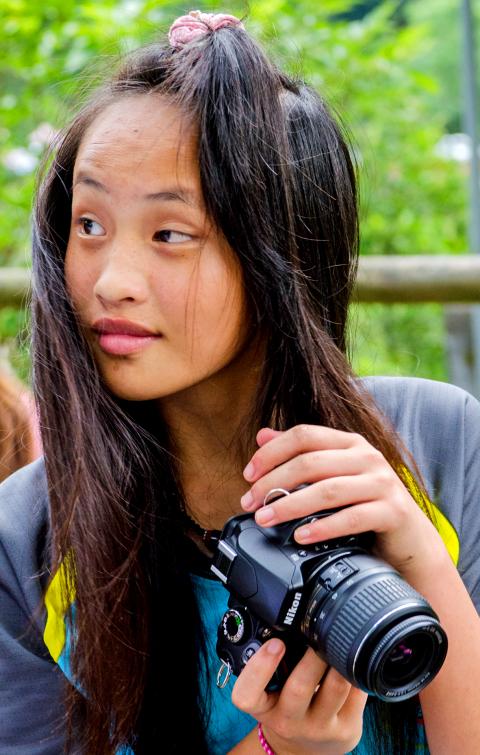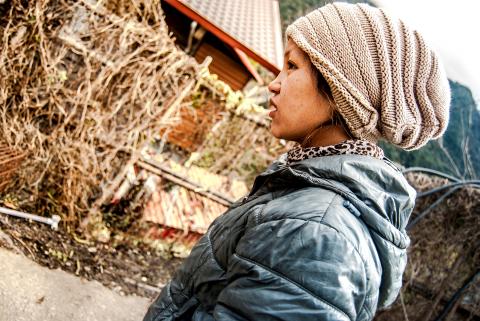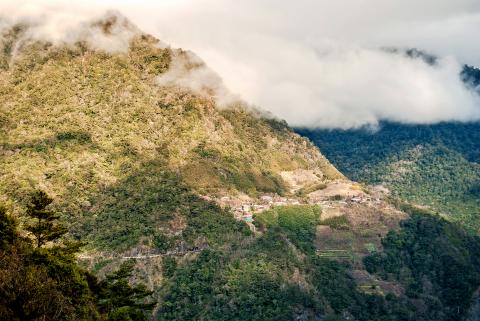Despite her initial dream of becoming a model, Tapas or Chang Ling-hsin (張凌馨) is a 14-year-old girl who is not obsessed with taking duck-face selfies. Armed with her Nikon D60, she focuses her 18-55mm lens and snaps a few shots of schoolchildren playing basketball outside of her old school, Taoshan Elementary School (桃山國小). The court overlooks the fogged-covered mountains of her hometown, an Atayal village called Chingchuan (清泉) which is near Hsinchu.
Her camera was a gift from Australian photographer Jonathan Burke, a long-time Taipei resident who regularly volunteers at the school. He gave it to Tapas in January after noticing her experimentation with angles and perspectives on her cellphone camera. Since then, Tapas has been photographing scenes from Chingchuan to submit to the Makapah Arts Award for images depicting Aboriginal culture.
CHALLENGING STEREOTYPES

Photo courtesy of Tapas
Despite her youth, Tapas understands the stereotypes people have of Aboriginal people and hopes to challenge those negative perceptions through her photography.
“I don’t feel oppressed or marginalized at all, which is how people might expect us to feel,” she said.
Aboriginal culture is often filtered to cater to the needs of tourists, especially in the form of costumes, dance and music. Tapas’ pride in her Atayal culture is evident in her pictures but in a different and subtle way. Her portraitures capture everyday life in Chingchuan from special occasions like birthday gatherings to friends having a chat. The message she wishes to convey is that Atayal people do the same things other people do.

Photo courtesy Jonathan Burke
“Each shot that I take captures the emotion I am feeling at that moment, whether it is happy, sad or frustrated, so while the pictures tell my own story, anyone can relate to them because life is about experiencing all these various emotions,” Tapas said.
Although her message is universal, Tapas’ love for Chingchuan is obvious. Gazing into the same mountainous backdrop, she talks about a picture she took of the fog resting on the trees after an argument she had with a classmate.
She says that “taking the picture really helped me to let go of the negative energy, and the feeling that other people glean from viewing it is also very peaceful.”

Photo courtesy of Tapas
FAMILY SUPPORT
Tapas’ family did not initially understand the meanings behind her photographs. She describes how they used to just look at them and say “great,” handing the camera back to her.
After seeing how dedicated Tapas has been towards pursuing this “hobby” though, her family, especially her mother, has been supportive of her decision to enter competitions and even pursue photography as a profession.

Photo courtesy of Tapas
This encouragement is important to Tapas since she is very close to her extended family. She calls her cousins “brothers and sisters,” and they are often the main subjects of her work.
Referring to a picture she took of her older sister playing the piano, Tapas says that if she had to write a caption for her photobook portfolio, it would read: “Everyone’s life is like a song and each song tells a different story.”
Tapas’ photography has caught the eye of Taipei-based foreign filmmakers who are working on a crowdfunding campaign on Fuudai.com to upgrade her lens to a Nikkor 18-200mm for a greater zoom function so that she can better tell her stories.
Tapas says she is still too young to decide her future. Although she adds that her mother believes photography is “at least a more practical option to pursue than modeling.”

Nine Taiwanese nervously stand on an observation platform at Tokyo’s Haneda International Airport. It’s 9:20am on March 27, 1968, and they are awaiting the arrival of Liu Wen-ching (柳文卿), who is about to be deported back to Taiwan where he faces possible execution for his independence activities. As he is removed from a minibus, a tenth activist, Dai Tian-chao (戴天昭), jumps out of his hiding place and attacks the immigration officials — the nine other activists in tow — while urging Liu to make a run for it. But he’s pinned to the ground. Amid the commotion, Liu tries to

The slashing of the government’s proposed budget by the two China-aligned parties in the legislature, the Chinese Nationalist Party (KMT) and Taiwan People’s Party (TPP), has apparently resulted in blowback from the US. On the recent junket to US President Donald Trump’s inauguration, KMT legislators reported that they were confronted by US officials and congressmen angered at the cuts to the defense budget. The United Daily News (UDN), the longtime KMT party paper, now KMT-aligned media, responded to US anger by blaming the foreign media. Its regular column, the Cold Eye Collection (冷眼集), attacked the international media last month in

A pig’s head sits atop a shelf, tufts of blonde hair sprouting from its taut scalp. Opposite, its chalky, wrinkled heart glows red in a bubbling vat of liquid, locks of thick dark hair and teeth scattered below. A giant screen shows the pig draped in a hospital gown. Is it dead? A surgeon inserts human teeth implants, then hair implants — beautifying the horrifyingly human-like animal. Chang Chen-shen (張辰申) calls Incarnation Project: Deviation Lovers “a satirical self-criticism, a critique on the fact that throughout our lives we’ve been instilled with ideas and things that don’t belong to us.” Chang

Feb. 10 to Feb. 16 More than three decades after penning the iconic High Green Mountains (高山青), a frail Teng Yu-ping (鄧禹平) finally visited the verdant peaks and blue streams of Alishan described in the lyrics. Often mistaken as an indigenous folk song, it was actually created in 1949 by Chinese filmmakers while shooting a scene for the movie Happenings in Alishan (阿里山風雲) in Taipei’s Beitou District (北投), recounts director Chang Ying (張英) in the 1999 book, Chang Ying’s Contributions to Taiwanese Cinema and Theater (打鑼三響包得行: 張英對台灣影劇的貢獻). The team was meant to return to China after filming, but